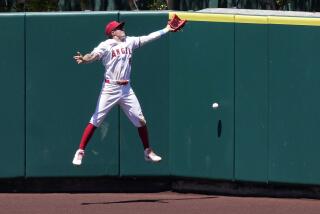Angels’ 6-5 Win Is Anything but Pretty
- Share via
Call it pigsty baseball, the kind of game one would expect when the two of the losingest teams in the American League are forced to play one another.
The Angels, who weren’t too proud to turn up their noses on this 6-5 decision over the Cleveland Indians Tuesday night, dragged this one out of the slime and grime. Five errors were committed, including two in one inning by Indian shortstop Cory Snyder. Seven of the 11 runs were unearned. The Indians ran themselves out of a big inning and into a comical 1-5-3-6-5-4 double play.
And the end came only after Angel reliever DeWayne Buice pitched himself in and out of a jam in the top of the ninth inning.
Buice, who replaced starter Jack Lazorko in the eighth, opened the ninth by serving up a home run off the right-field foul pole by Mel Hall. Buice then walked Tony Bernazard, placing the potential tying run on base.
But Buice came back to get Snyder on a pop fly to short and Brook Jacoby on a double play that closed out an unsightly, but not unwanted, victory for the Angels.
The Angels were coming off back-to-back shutout losses that left them with 32 defeats in 1987. Among AL teams, only Cleveland, now with 37 and Chicago with 32, have lost as many.
To understand what type of season this has been for the Angels, note that Lazorko’s victory, which evened his record at 2-2, moved him into a tie for third among Angel starting pitchers for most victories. Only Mike Witt (7-4) and John Candelaria (5-2) have more.
For the fifth time in as many starts, Lazorko pitched the Angels into the eighth inning. He allowed six hits and three walks through seven innings, departing after walking Brett Butler to open the eighth.
Lazorko also struck out four but his best delivery of the night came on a pickoff play that got him out of a three-run fourth inning.
Yep, that old favorite, the 1-5-2-6-5-4 double play.
The Indians had taken a 4-1 lead on an error by Mark McLemore, two bunt singles, a sacrifice fly, an intentional walk and a single by Brook Jacoby when Lazorko readied to pitch to Rick Dempsey. Snyder led off third base and Jacoby off first.
With a pump fake to third base, and then first, Lazorko caught Snyder in a rundown between third and home. A chase ensued, but before Snyder could be retired, catcher Bob Boone threw to Dick Schofield, who made a quick tag of Jacoby, who was barreling into third. Schofield then threw home to resume the pursuit of Snyder, who was eventually tagged by McLemore.
Don Sutton, a 22-year veteran, said he had never seen such a thing.
Gene Mauch, who has been around slightly longer, said he’d seen the pickoff “work several times--although I don’t remember it ever working for a double play.”
Lazorko, though, claimed it was part of his standard game plan.
“I’ve worked on that throw, I’ve got it down,” Lazorko said. “It’s fundamentals. I have that and a lot of other things in my arsenal.
“I knew they’d be running and it worked. He (Snyder) wasn’t even thinking. We got a double play out of it. Heck, I got a win out of it.”
The Angels scored five unearned runs in the fifth and seventh innings to produce that win. Thanks to first baseman Joe Carter and shortstop Snyder, who moved in from right field in the sixth inning, the Angels scored enough to take a 6-4 advantage into the eighth.
In the fifth inning, Schofield reached base when Carter misplayed his ground ball down the line. Schofield scored on a single by Devon White to cut the Angels’ deficit to 4-2.
Then, two errors by Snyder paved the Angels’ way to four runs in the bottom of the seventh inning.
Snyder fielded a one-out grounder by White with Pettis breaking from first base. It was a potential double play ball, but Snyder threw wildly past second base. Pettis wound up on third base and White on second on the play.
Joyner then singled to left, scoring both runners and tying the game.
After a groundout by Brian Downing, the Angels loaded the bases on walks to Jack Howell and Doug DeCinces. That prompted Cleveland Manager Pat Corrales to bring on his fourth relief pitcher, Mark Huismann, to pitch to McLemore.
McLemore responded with a sharp grounder to the left of second base. Snyder stopped the ball with a dive, but had no play at either first base or second. Joyner had already scored, so Snyder threw home in an attempt to erase Howell.
But his relay sailed high over the head of catcher Rick Dempsey, enabling Howell to score easily.
And that’s how the Angels won this one.
You want Mauch to call it ugly? No way. The most critical appraisal Mauch could manage was, “We weren’t very lucky with the balls we hit hard, but we were kinda lucky with the ones that weren’t.”
And very lucky on one double play that caught the Indians running out of control.
Angel Notes
To make room for George Hendrick, who was re-activated from the disabled list Tuesday, the Angels optioned rookie pitcher Mike Cook to Edmonton. Cook, 23, was 1-2 with a 5.50 ERA in 16 appearances with the Angels, most of them in long relief. He made one start, surrendering the first five runs in a 12-0 loss to Toronto May 18, but Cook said his ineffectiveness in three of his last four relief outings is what cost him his job. On May 25 against New York, Cook gave up a run-scoring single to the first hitter he faced; on May 27 in Baltimore, he balked in a run before throwing a pitch; and last Wednesday in New York, he gave up two hits and two runs in one-third of an inning. “Those last three weren’t pretty,” Cook said. “I knew this was coming. I thought I’d come off (the roster) when Donnie (Moore) came back. I was very inconsistent--two games good, two games bad. You can’t expect to stay around pitching like that.” Cook will be used as a starter in Edmonton. “His biggest need is consistency,” Angel Manager Gene Mauch said, “and the only way he can become consistent is to get some innings in. He’d have six wonderful innings against the Yankees one time (May 22) and the next time, nothing good happens. He was rushed up here because he has great stuff. He hasn’t had much professional experience (1 1/2 years in the minor leagues before 1987). He had a lot of innings in college, but that’s not exactly the same.”
More to Read
Go beyond the scoreboard
Get the latest on L.A.'s teams in the daily Sports Report newsletter.
You may occasionally receive promotional content from the Los Angeles Times.






